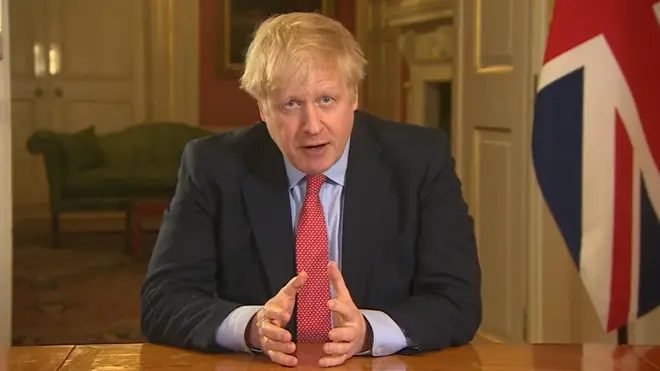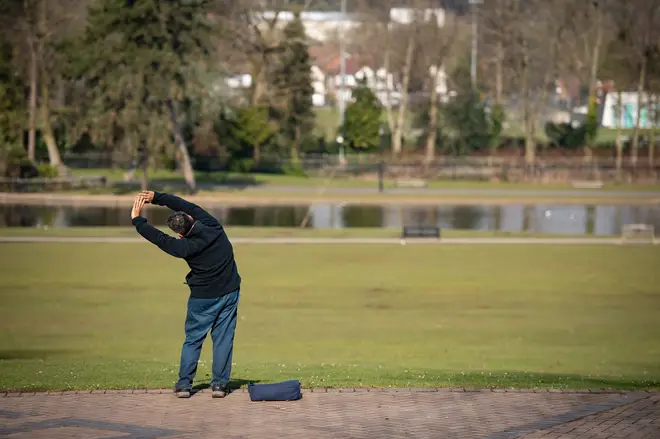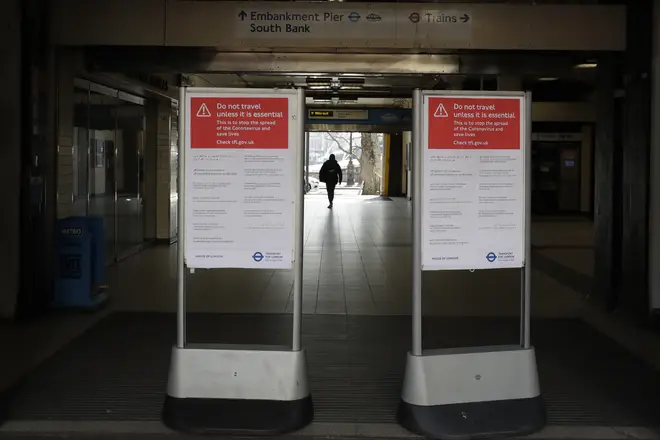When did the UK lockdown start and how long will it last?
28 May 2020, 10:09 | Updated: 23 June 2020, 16:12

Boris Johnson reveals his end of lockdown plan in-full
The UK was put into lockdown on 23 March in an unprecedented step to attempt to limit the spread of coronavirus.
Boris Johnson announced in March that all UK residents must stay at home to protect the NHS amid the growing threat of coronavirus.
In an unprecedented broadcast to the nation on Monday (23 March), The Prime Minister announced that the police will now have the power to fine people if they leave their homes for any reason other than the following:

- Shopping for basic necessities
- One form of exercise a day - either alone or with members of your household
- Medical need or to provide care help vulnerable person
- Travel to work - but only if necessary and you cannot work from home
Read more: Over 400,000 sign up for the coronavirus NHS volunteer scheme in 24 hours
He said: "These are the only reasons you should be leaving your home.
"You should not be meeting friends, you should not be meeting family members who don't live in your home, you should not be shopping except for essentials.

"If you don't follow the rules, the police have power to enforce them including with fines. We will immediately close all shops selling non-essential goods, other premises including libraries and places of worship.
Read more: Employers could be fined for demanding workers turn up if they could be at home
"We will stop all gatherings of more than two people in public and stop all social events - excluding funerals".

Read More: How do you report someone for not social distancing?
How long will the UK lockdown last?
Boris Johnson said at the time that these measures will be in place for three weeks, and that they will be reviewed at the end of this period.
Dominic Raab announced at the press conference on 9 April that it was still too early to lift lockdown measures, saying: "We don’t expect to make any changes to the measures currently in place at that point and we won’t until we’re confident, as confident as we realistically can be, that any such changes can be safely made."
He also added: "We’ve still got a long way to go … We’ve still not passed the peak of this virus."
On Sunday 30 March, Deputy Chief Medical Officer Dr Jenny Harries said that lockdown measures could last up to six months - and possibly longer.
She said: "The issue of the three weeks is for us to review where we are and see if we've had an impact jointly on the slope of that curve.
"But I think to make it clear to the public if we are successful we will have squashed the top of that curve, which is brilliant, but we must not then suddenly revert to our normal way of living that would be quite dangerous.
"If we stop then all of our efforts will be wasted and we could potentially see a second peak. So over time, probably over the next six months, we will have a three-week review."
She also added that it's 'plausible' that restrictions could be in place for longer than that.
Lockdown extension: 16 April
On 16 April, Dominic Raab announced that the lockdown would be extended for 'at least' three weeks.
Speaking at the daily press conference, he said: "If we rush to relax the measures that we have in place we would risk wasting all the sacrifices and all the progress that has been made.
"That would risk a quick return to another lockdown with all the threat to life that a second peak to the virus would bring and all the economic damage that a second lockdown would carry."
He said that the following five conditions must be met before lockdown restrictions can be lifted:
1) That the NHS can cope
2) That there is a 'sustained and consistent' decrease in daily deaths
3) There needs to be reliable data from SAGE that the rate of infection is decreasing to 'manageable levels'
4) The supply of tests and PPE can meet future demand
5) To be confident that any changes will not risk a second peak in the virus
What did Boris Johnson say about lockdown on his first speech since recovering from coronavirus?
Boris Johnson addressed the nation on Monday 27 April on his first day back at work following his coronavirus recovery.
The Prime Minister said that it was too early to ease lockdown, but that we are beginning to 'turn the tide'.
He said: "We must recognise the risk of a second spike. That would be not only a new wave of death and disease, but also an economic disaster and we would be forced once again to slam on the breaks of the whole country and reimpose restrictions in such a way as to do more and lasting damage.
"I want to get this economy moving as fast as I can, but I refuse to throw away all the effort and the sacrifice of the British people and risk a second major outbreak and huge loss of life and the overwhelming of the NHS."

Prime Minister Boris Johnson addresses the nation after returning to work
He added: "Thanks to our collective national resolve, we are on the brink of achieving that first clear mission - to prevent our NHS from being overwhelmed in a way that tragically we have seen elsewhere.
"And that is how and why we are now beginning to turn the tide."
What is Boris Johnson's plan for coming out of lockdown?
Boris Johnson said on the 30 April that he will unveil a 'comprehensive plan' to getting the UK out of lockdown 'next week'.
Speaking at the daily press conference, he said: He said: "For the first time, we are past the peak of this disease. We are past the peak, and we are on the downward slope."
However, he added that, until we find a vaccine, "we are going to have to beat this disease by our growing resolve and ingenuity."
He continued: "I will be setting out a comprehensive plan next week to explain:
1) How we can get our economy moving
2) How we can get our children back to school, back into childcare
3) How we can travel to work
He then added: "In short, how we can continue to suppress the disease but at the same time restart the economy.
Read more: Boris Johnson says it's too early to ease lockdown in first speech after coronavirus recovery
"A huge amount of work has been going on with that plan, and of course as we produce it we are being guided by the science - and we will try to build the maximum political consensus across all parties and across the UK."
Boris reiterated that the above five key conditions must be met before we reach that point.
What is Boris Johnson's lockdown exit plan?
In a televised address to the nation on 11 May, Boris Johnson revealed that the government is planning to ease coronavirus lockdown in phases over the next few months.
In the first phase, which started that week, Boris Johnson said that those who cannot work from home could return to work. He urged those doing so to refrain from using public transport if possible. The public were also told that they can take part in 'unlimited outdoor exercise', as well as sit in the sun and play sport with their household. Read more about that here.

Boris Johnson reveals his end of lockdown plan in-full
The second phase could see some shops and schools reopen from June 1st. Read more about that here.
The third phase could see some hospitality and public spaces reopen from July.
All these phases are dependent on the above five conditions.
What is happening with lockdown easing in England? 23 June update
On Tuesday 23 June, Boris Johnson announced that a further easing of lockdown restrictions will take place on 4 July.
Restaurants, hairdressers, museums, galleries and pubs will be allowed to reopen at this time, subject to social distancing guidelines.

Pubs, Restaurants, Hotels & Hairdressers can reopen from 4th July
From this date, the 2m rule will be reduced to '1m+', with Boris Johnson saying: "Given the significant fall in the prevalence of the virus we can change the two metre social distancing rule from 4 July."
He acknowledged that the two-metre rule 'prevents all but a fraction of hospitality from operating', and added that he asked experts to stage a review of the guideline two weeks ago.
He said that, from July 4, "where it is possible to keep two metres apart, people should. But where it is not, we will advise people to keep a distance of 1 metre plus."

























